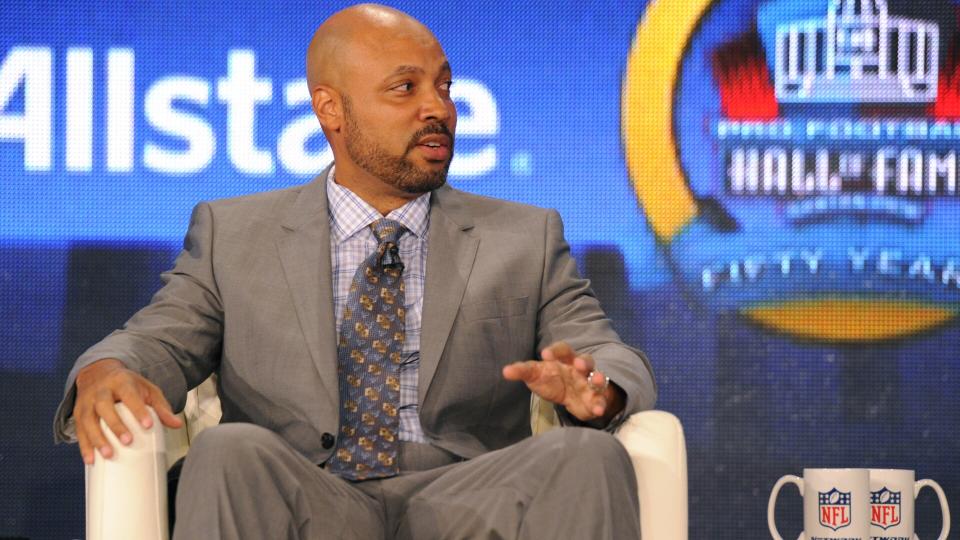Jim Trotter: I was told not to report NFL wanted Bills-Bengals to resume

In his new lawsuit against the NFL, former NFL Network reporter Jim Trotter alleges that the league exercises control of NFL Media, to the extent that the league "throttles content that is critical of the NFL." To prove that point, Trotter makes specific allegations regarding his efforts to report information learned regarding the cancellation of the Bills-Bengals game on January 2, 2023, after Buffalo safety Damar Hamlin suffered cardiac arrest on the field.
One of the issues that lingered following the determination that the game would not proceed was whether a preliminary decision had been made to continue the game.
"In the days that followed, Mr. Trotter learned that the teams were in fact instructed that play would resume after a five-minute warm-up, explaining why the players had been doing so," the complaint alleges at paragraph 161. "This decision, Mr. Trotter and other reporters learned, came from the NFL league office not from the officials on the field."
From paragraph 162: "This directive was uncovered by several reporters and was widely reported in the media in the days that followed. However, the NFL staunchly denied these claims, as reflected in the various articles. Mr. Trotter, for his part, investigated further. He received confirmation from multiple sources refuting the NFL’s version and its denial."
In the next paragraph of the complaint, Trotter says he "reached out to Brian McCarthy, the NFL’s Vice President of Communications, seeking comment from the NFL employee who, according to Mr. Trotter’s sources, informed the teams that they would resume play." Per the complaint, "Mr. McCarthy simply denied the allegations and refused to make the person available to Mr. Trotter."
From paragraph 163: "Mr. Trotter, being a tenacious reporter, pushed further that he needed to speak to the individual or at the very least needed a comment from that person. Mr. McCarthy responded, knowing that Mr. Trotter was not 'merely' a journalist but also an NFL employee, 'I will call your supervisor if you don’t let this go.' Mr. Trotter responded that he was 'fine with' Mr. McCarthy calling his supervisor because he was doing his job."
"Soon after, Mr. Trotter received a text message from Mr. [Todd] Sperry," the complaint alleges at paragraph 165. "Mr. Sperry directed Mr. Trotter to 'stand down' in his reporting on the story. Mr. Trotter responded, 'I thought it was our job as journalists to always pursue the truth. Is that not the case?' Mr. Sperry never responded to Mr. Trotter’s text message — which speaks for itself."
The incident itself is not directly relevant to Trotter's claims. It is relevant to any effort to prove that the NFL and NFL Media are one in the same, and that the NFL controls NFL Media and NFL Network.
"This entire incident makes it very clear that the NFL controls NFL Media, throttles content that is critical of the NFL and will not hesitate to silence employees who speak out regarding matters that are unfavorable to the league," the complaint alleges at paragraph 166. "While in this case, the matter involved the NFL’s handling of a sensitive incident involving a player injury, it was consistent with the resistance Mr. Trotter faced when speaking up regarding discrimination."
Frankly, the league has been unreasonably sensitive to any suggestion that anyone in the league office initially directed the Bills-Bengals game to proceed. It would have been much easier to simply acknowledge that players often suffer injuries that require a stoppage of the game, and that the standard approach is to proceed. In this case, once it became clear that Hamlin had suffered a serious injury, the plan changed.
For these purposes, Trotter's point is that the NFL can and will exercise control over journalists employed by the league. It's really no surprise; it confirms the inherent conflict of interest that arises when a sports league hires and pays reporters to cover the league.
The right approach is to have a firewall in place between the reporting function and the league's business operations. Over the years, there have been multiple examples of that not being the case.
Put simply and clearly, the NFL does not want its in-house media operation to engage in reporting, analysis, or commentary that makes the league look bad. Frankly, the NFL periodically bristles when reporters employed by league partners engage in reporting, analysis, or commentary that makes the league look bad.
If that attitude is displayed from time to time when it comes to reporters who don't work for the league, it certainly will be displayed from time to time, or perhaps more frequently, when it comes to those who do.

